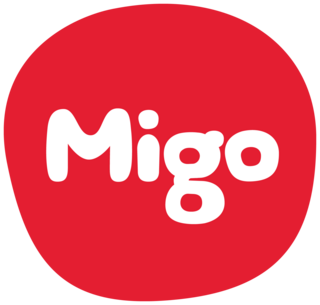
Streaming media is multimedia that is constantly received by and presented to an end-user while being delivered by a provider. The verb "to stream" refers to the process of delivering or obtaining media in this manner; the term refers to the delivery method of the medium, rather than the medium itself, and is an alternative to file downloading, a process in which the end-user obtains the entire file for the content before watching or listening to it.

Video on-demand (VOD) is a video media distribution system that allows users to access video entertainment without a traditional video entertainment device and without the constraints of a typical static broadcasting schedule. In the 20th century, broadcasting in the form of over-the-air programming was the commonest form of media distribution. As Internet and IPTV technologies continued to develop in the 1990s, consumers began to gravitate towards non-traditional modes of content consumption, which culminated in the arrival of VOD on televisions and personal computers.

Streaming television is the digital distribution of television content, such as TV shows, as streaming video delivered over the Internet. Streaming TV stands in contrast to dedicated terrestrial television delivered by over-the-air aerial systems, cable television, and/or satellite television systems.
Digital distribution is the delivery or distribution of digital media content such as audio, video, e-books, video games, and other software. The term is generally used to describe distribution over an online delivery medium, such as the Internet, thus bypassing physical distribution methods, such as paper, optical discs, and VHS videocassettes. The term online distribution is typically applied to freestanding products; downloadable add-ons for other products are more commonly known as downloadable content. With the advancement of network bandwidth capabilities, online distribution became prominent in the 21st century, with prominent platforms such as Amazon Video, and Netflix's streaming service starting in 2007.
GameFly is an American online video game rental subscription service that specializes in providing games for game consoles and handheld game consoles such as: PlayStation 4, Xbox One, Nintendo Switch, Xbox 360, PlayStation 3, Wii, GameCube, Xbox, Wii U, PlayStation 2, Game Boy Advance, DS, 3DS, PSP, and PlayStation Vita.
The open music model is an economic and technological framework for the recording industry based on research conducted at the Massachusetts Institute of Technology. It predicts that the playback of prerecorded music will be regarded as a service rather than as individually sold products, and that the only system for the digital distribution of music that will be viable against piracy is a subscription-based system supporting file sharing and free of digital rights management. The research also indicated that US$9 per month for unlimited use would be the market clearing price at that time, but recommended $5 per month as the long-term optimal price.
RSS-TV is an XML-based navigation protocol for Internet media services based on the RSS standard.
Digital Interactive Systems Corporation is a company specializing in gaming technology for PCs. They are the creators of the DISCover technology which allow PC games to be played like a video game console. The technology, which features the "Drop and Play" engine, auto-plays CDs or DVDs and automates scripts for installing and updating games. Consoles with the engine connect to the Internet for game updates. This technology debuted at the 2003 Electronic Entertainment Expo.
Rakuten OverDrive, Inc. is an American digital distributor of eBooks, audiobooks, music, and video titles. The company provides secure management, digital rights management and download fulfillment services for publishers, libraries, schools, and retailers. OverDrive's catalog includes more than 2 million digital titles from more than 5,000 publishers. The company's global network includes more than 43,000 public libraries, K-12 schools, colleges and universities, and corporations in 75 countries worldwide. OverDrive was founded in 1986 and is based in Cleveland, Ohio.
Internet television in Australia is the digital distribution of movies and television content via the Internet. In Australia, Internet television is provided by five major pay-per-view providers, in addition to several niche television streaming services. Australia's five major free-to-air television networks all offer catch up TV of previously broadcast content to watch via the Internet or via podcasts - drawing on both domestic and foreign content. A feature of Internet television is that a user can view TV or video on demand. Some distributors provide content as downloads, whiles other streaming media; the main difference being that with downloads the end-user must have storage capacity for the content on their device and must wait for the download to be completed before the content can be viewed, while streamed content can be viewed almost immediately, but is not stored for a later second viewing.

RealNetworks, Inc. is a provider of Internet streaming media delivery software and services based in Seattle, Washington, United States. The company also provides subscription-based online entertainment services and mobile entertainment and messaging services.
Over the top (OTT) media service is a streaming media service offered directly to viewers over the Internet. OTT bypasses cable, broadcast and satellite television platforms that traditionally act as a controller or distributor of such content.
In the video game industry, digital distribution is the process of delivering video game content as digital information, without the exchange or purchase of new physical media. This process has existed since the early 1980s, but it was only with network advancements in bandwidth capabilities in the early 2000s that digital distribution became more prominent as a method of selling games. Currently, the process is dominated by online distribution over broadband internet.
HBO Go is a TV Everywhere service offered by the American premium cable network HBO. It allows HBO subscribers to stream video on demand selections of HBO content, including current and past series, films, specials, and sporting events, through either the HBO website, or apps on mobile devices, video game consoles, and digital media players. The service first launched on February 18, 2010.
The 59th Technology & Engineering Emmy Awards was held on January 8, 2008 at the 2008 International Consumer Electronics Show in Las Vegas.

dittoTV was a Video on demand platform launched in 2012, from the digital arm of Zee Entertainment Enterprises Limited (ZEE), Zee Digital Convergence Limited. The service was integrated with Zee5 on February 15, 2018. It was India's most popular Over-the-top media services TV distribution platform offering LIVE TV and Catch Up Content to end consumers on their mobile phones, tablets, laptops, desktops, entertainment boxes and connected TVs.
Video game monetization is the process that a video game publisher can use to generate revenue from a video game product. The methods of monetization may vary between games, especially when they come from different genres or platforms, but they all serve the same purpose to return money to the game developers, copyright owners, and other stakeholders. As the monetization methods continue to diversify, they also affect the game design in a way that sometimes leads to criticism.
Iflix is a free and subscription video on demand (VOD) service focused on emerging markets. Its global headquarters are in Kuala Lumpur, Malaysia. The site serves as a digital hosting and distribution platform for Western, Asian, and Middle Eastern TV shows and movies obtained through partnerships with over 150 studios and content distributors globally including Metro-Goldwyn-Mayer, Disney, Warner Bros, Paramount, NBC Universal, Fox, CBS, BBC, Sony Pictures and Discovery.

Stadium is a digital television and internet sports network operated as a multi-platform sports network. Stadium includes a 24/7 linear feed distributed across both digital and broadcast platforms, as well as on-demand (VOD) digital content including additional live games and events including AT&T SportsNet Rocky Mountain. Stadium has a number of minority owners including BAMTech, Meredith Corporation, PGA Tour, Silver Chalice and Sinclair Broadcast Group. The network is headquartered at The United Center in Chicago, Illinois.

Migo is a multinational D2C company that owns and operates a last mile platform distributing digital products and services to emerging market consumers. The company aims to use its platform to bridge the digital divide for billions in emerging markets who cannot afford large volumes of data required for many online services.






